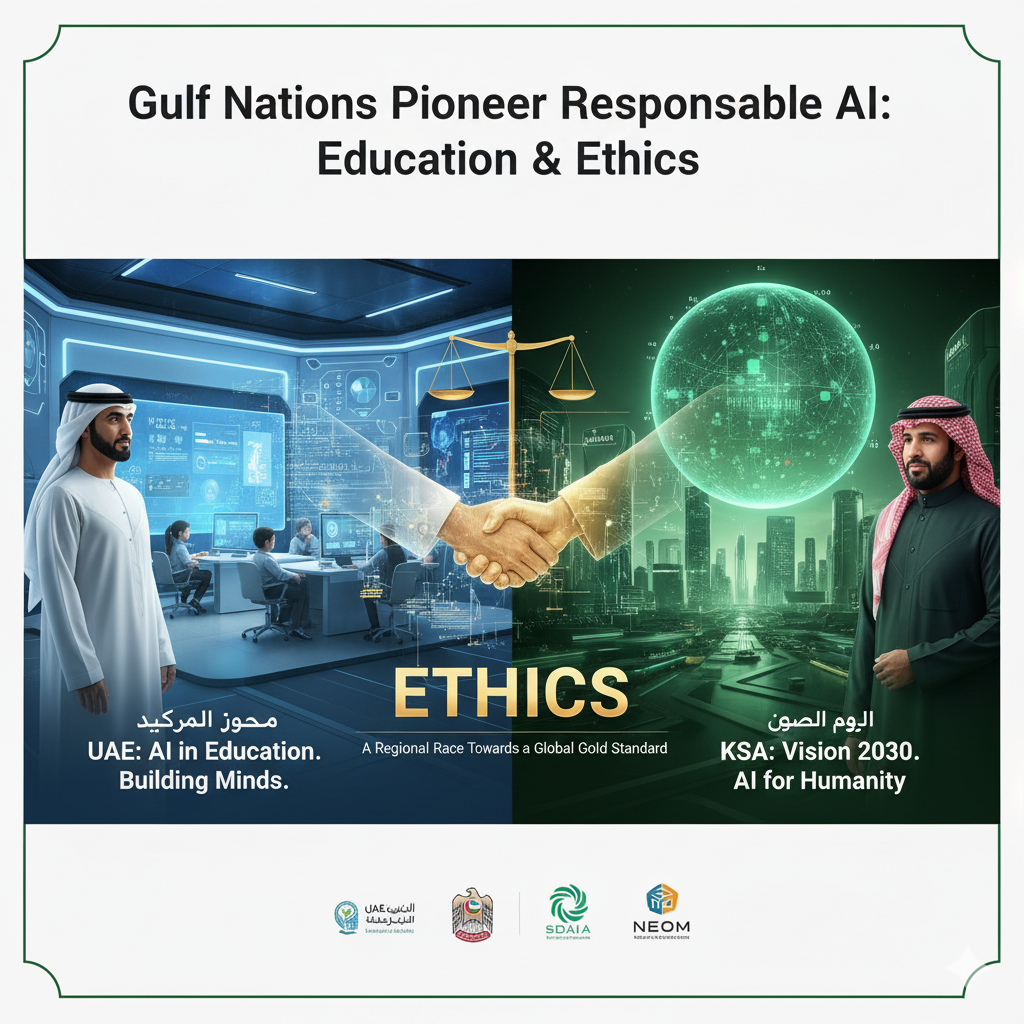
UAE and KSA Lead the AI Education Revolution: A Blueprint for Global Ethical Innovation
Share
In a bold move that cements the UAE’s position as a global pioneer in futureproof governance, His Highness Sheikh Mohammed bin Rashid Al Maktoum, Vice President and Ruler of Dubai.
HH Sheikh Mohammed Bin Rashid Al Maktoum
We are building a new reality for our people, a new future for our children, and a new model of development.
Announced the integration of artificial intelligence (AI) as a core subject across all stages of government education. This visionary decision, unveiled just days ago, transcends mere policy—it reflects a courageous commitment to redefining the foundations of a society ready to lead the AI era.
Parallel to this, Saudi Arabia’s Crown Prince Mohammed bin Salman (MBS) has accelerated the Kingdom’s own AIdriven transformation, signaling a regional race toward technological sovereignty. But beyond competition, these Gulf nations offer the world a critical lesson: innovation without ethical scaffolding is a ticking time bomb.
The UAE’s AI Education Revolution: Building Minds, Not Just Machines
Sheikh Mohammed’s announcement marks a seismic shift in education strategy. By embedding AI literacy from primary schools to universities, the UAE is cultivating a generation fluent in coding, machine learning, and data analytics.
But more importantly, the initiative emphasizes critical thinking, problemsolving, and ethical reasoning—skills vital for navigating AI’s societal impacts. Unlike nations that treat AI as a niche IT topic, the UAE recognizes it as a multidisciplinary force shaping economics, governance, and culture.
Saudi Arabia’s Parallel Vision: A Regional Synergy
Saudi Arabia’s NEOM and Vision 2030 projects mirror this ambition. Under MBS, the Kingdom is investing billions in AI infrastructure, smart cities, and digital upskilling.
NEOM : Government Administration
Together, the UAE and KSA exemplify a regional ethos: technology must serve humanity, not vice versa. Their rivalry is less about dominance and more about setting a gold standard for holistic AI adoption—one that prioritizes long term societal benefit over short term gains.
Global Lessons: Beyond Investment, Build Foundations
While countries like the U.S., China, and EU nations pour resources into AI development, many neglect the foundational pillars necessary for sustainable growth. The UAE and Saudi models offer a blueprint:
1. Start Early, Start Right:
Integrate AI education at all academic levels, blending technical skills with ethics. Teach students not just how to build algorithms, but why transparency, fairness, and accountability matter.
2. Governance Before Growth:
Establish robust AI regulatory frameworks in tandem with technological deployment. The UAE’s AI Ministry and Saudi’s (Saudi Data and AI Authority) demonstrate proactive governance—addressing biases, privacy risks, and security threats before they escalate.
SDAIA | سدايا
Government Relations Services
3. Ethics as a Non-Negotiable:
Embed ethical AI principles into national strategies. For instance, the UAE’s “AI Ethics Guidelines” mandate humancentric design, while Saudi’s National Data Management Office ensures data sovereignty.
4. Public Private Symbiosis:
Foster partnerships between governments, tech giants, and academia. Dubai’s “AI Campus” and Riyadh’s LEAP tech conference are hubs where innovation meets accountability.
5. Guardrails for the Vulnerable:
Prioritize data privacy—especially for children—and implement stringent content moderation laws. AIdriven education tools must filter harmful content and protect user data across all age groups.
A Call for Global Leadership: Safe AI by Design
The UAE and KSA’s strategies underscore a truth often ignored: AI’s risks multiply when ethics lag behind innovation. Nations racing to adopt AI must avoid the “move fast and break things” mindset. Instead, emulate the Gulf’s dual focus:
- Build grassroots literacy to empower citizens as informed users, not passive consumers.
- Legislate aggressively to prevent monopolies, algorithmic discrimination, and data exploitation.
- Globalize ethics by advocating for international AI treaties, ensuring no country becomes a rogue actor.
Conclusion: Humanity’s AI Crossroads
Sheikh Mohammed and MBS are not just preparing their nations for the future—they are redefining what leadership looks like in the 21st century. Their message to the world is clear: AI’s promise depends on our willingness to govern it wisely. For other nations, the choice is stark: replicate the Gulf’s courage to prioritize ethics and education, or risk creating a world where AI becomes a curse veiled in progress.
The UAE and Saudi Arabia have laid the groundwork. Now, the world must follow—before it’s too late.
Final Note: As AI reshapes societies, let us ensure it remains a tool for humanity, by humanity—a blessing that safeguards dignity, privacy, and collective prosperity. The time to act is now.
